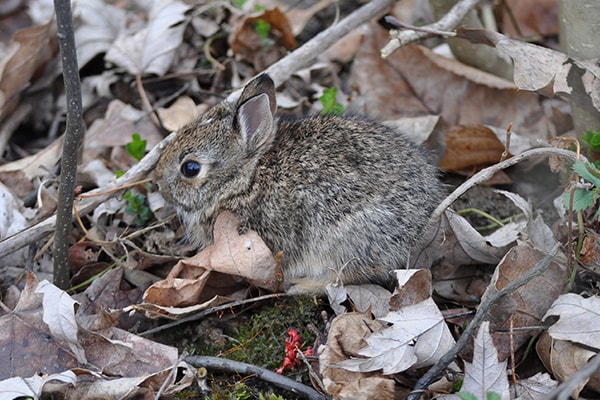What should I do? I've found...
Eastern Cottontail Rabbits often build their nesting sites in yards and open spaces. Baby bunnies are almost never abandoned, even when they are all alone. If you stumble across one of their nests, do not move the baby bunnies because their mother will be unable to find them. She will return at dusk and dawn to feed and groom her babies. Keep in mind that cottontails regularly survive in suburban areas even with dangers such as pets, predators and automobiles.
A fawn lying quietly by itself with no mother in sight is perfectly normal. Deer do this to protect their young, as the presence of an adult would attract the attention of predators. Even if the fawn seems to be in a “dangerous” location, do not move it as the mother probably will not be able to find her baby. If a fawn is walking around and making noise, this is a sign that it may be abandoned and in need of assistance.
A baby bird with skin still visible or only covered in downy feathers should be placed back in the nest or in an artificial nest. If fully feathered but unable to fly, the bird is a fledging that should be left alone as it is in the process of learning critical survival behaviors.
Raccoons and squirrels will frequently retrieve their babies when they end up out of the nest too early. They often maintain more than one nest or den site and will move their babies as needed. If a baby is found out of its nest and is not yet able to climb on its own, place it in an open container off the ground and give plenty of time to allow the mother to retrieve her baby.
Young ducks and geese can become separated from their families when following parents to water. Search nearby water locations and return the baby to its family, if possible. Ducks often nest miles from water, even in parking lots and suburban yards, and can successfully walk their babies to the nearest water source on their own.
Opossums are North America’s only marsupials, which means they keep their babies in a pouch. Young opossums will stay with their mom about a month after they leave her pouch (around 4-months-old). If you find an opossum alone at this age, it may be in need of human assistance.
A baby bird of prey that cannot yet grasp with its talons needs to be placed back in its original nest or in an artificial nest in the exact area it was found. If the young bird can grip with its talons, it should be placed on a branch at the nest site. Its parents will return and continue caring for it.
Did you find a baby animal?
To help a baby animal, call the Center’s wildlife staff at 440-871-2900 before intervening.
Wildlife intakes of baby animals from the public are offered at no charge. Due to high demand for our services, please anticipate leaving a message for our wildlife specialists who will return your call.
Baby Animal Fast Facts
- Baby wildlife is rarely abandoned in nature. Mothers will often leave their young unattended for hours to collect food or prevent the attraction of predators.
- Baby animals do not need to be protected from the natural dangers in their lives. Pets, predators, and automobiles are a natural part of their urban and suburban environments. Baby wildlife must grow among these circumstances in order to learn how to successfully coexist with them.
- Please do not feed baby animals. Each species requires a specialized diet and feeding an animal the wrong food can be harmful to its health.
- Wild animals will not abandon their babies due to the scent of humans. In fact, most birds have little sense of smell! While mammals have a strong sense of smell, the human scent is not nearly enough of a danger to cause mothers to abandon their hormonal and maternal behaviors.
- Baby animals will never receive the same quality of care from humans as they would receive from their natural parents. Human care, to some extent, is always damaging to the animal. For this reason, human intervention should be the last resort.


